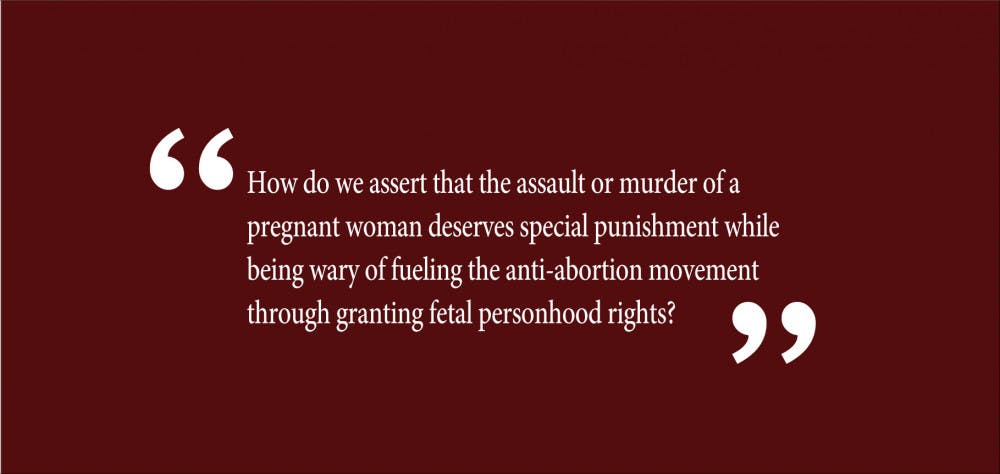Given the conservative-leaning U.S. Supreme Court and unclear fate of Roe v. Wade, the fight to protect a woman’s right to abortion continues to be waged at the federal level and in Rhode Island. On March 7, Rhode Island’s House of Representatives voted 44-30 to protect legal abortion at the state level in case Roe is overturned. The legislation prohibits government regulation of an abortion “prior to fetal viability” — the stage at which the fetus can survive outside of the womb, either independently or with “artificial support.” After this window, abortion would be banned unless deemed necessary for the woman’s health or survival. The legislation must be approved by the state Senate before it is enacted into law.
While abortion rights activists get to celebrate this incremental victory, many, including anti-abortion activists and members of the Roman Catholic Church, are expectedly disappointed. The legislation’s proposed overturning of the 1970s “quick child law” is a point of particular contention for these individuals. The law protects pregnant women and their fetuses by classifying actions that result in “the willful killing of an unborn quick child” as manslaughter. Opponents of abortion warn against the repeal of the state’s only protection of an ‘unborn child’ terminated as a result of a physical attack upon the mother. Meanwhile, abortion rights advocates argue that the “quick child law,” also known as the fetal homicide law, is just a strategy to advance the anti-abortion agenda by granting fetuses separate personhood rights.
Rhode Island’s fetal homicide law sheds light on a complicated question: Should the assault or murder of a pregnant woman be counted as two separate crimes? In 2004, then President George W. Bush thought so when he signed “Laci and Connor’s Law,” following the murder of Laci Patterson, then eight-months pregnant, by her husband Scott Peterson. Peterson was charged for murder on two counts for both Laci and her unborn son. The federal act stated that any harm inflicted upon a pregnant woman that also causes either death or bodily injury to the child would be held legally accountable for two separate crimes.
Many would agree that the injury or murder of a pregnant woman is in its own category of immorality. However, many pro-choice advocates view Bush’s legislation as a crafty method to extend separate personhood rights to fetuses. This strategy justifies the “abortion is murder” argument and weakens the case for a woman’s right to choose. How do we assert that the assault or murder of a pregnant woman deserves special punishment while being wary of fueling the anti-abortion movement through granting fetal personhood rights?
The Supreme Court’s 1992 decision in Planned Parenthood of Southern Pennsylvania v. Casey created a framework that established the grounds for punishment for the assault of a pregnant woman. In summary, Casey evaluated the following provisions in a Pennsylvania law: a 24-hour waiting period before a pregnant woman could receive an abortion, the ability to try and persuade a woman to choose birth over an abortion, the need for parental consent for minors and the requirement that a married woman notify her spouse prior to receiving an abortion.
Through its decision in Casey, the Court upheld the most crucial provision of Roe v. Wade — a woman’s right to terminate her pregnancy before viability. But the case did not grant abortion advocates everything they wished for: It removed the trimester framework set in Roe, thus allowing regulation of abortion throughout a woman’s pregnancy and not just in the final two trimesters. At the same time, the Court instituted the powerful stipulation that no one can place an “undue burden” on the woman’s decision to give birth or to have an abortion. Therefore, even with the unfortunate dismantling of the trimester rule, the “undue burden” provision prevents the government from completely denying a woman’s right to decide the fate of her pregnancy. Thus, Casey ultimately places great emphasis on the central principle that a woman has the final authority over her pregnancy.
With this guideline in place, the “right to choose,” as ruled by Roe and reinforced by Casey, should be the grounds on which the criminal justice system punishes those who injure or murder pregnant women. When an individual harms a pregnant woman and consequently injures or terminates her fetus, the action is a theft of the woman’s constitutionally protected reproductive rights. In other words, when a woman and her fetus suffer harm clearly against her will, her pregnancy is put at risk without her consent. This is a violation of the woman’s right to decide the outcome of her pregnancy. Punishment on these grounds delivers justice to victims without setting the dangerous precedent of extending personhood rights to fetuses.
When a woman suffers an attack that either injures or terminates her fetus, one can easily consider such an unfortunate event as a double offense, given that one life and another potential life have been harmed. However, one must recognize that this seemingly justified framework ultimately works against women as a whole. Extending personhood status to fetuses through legislation and even language like ‘unborn baby’ or ‘unborn child’ would legitimize the anti-abortion argument and criminalize women who want to end their pregnancies. Instead, we must deliver justice to pregnant women who are victims of injury or murder on the basis of punishing those who infringe upon their right to determine the destiny of their bodies.
Jordan Allums ’21 can be reached at jordan_allums@brown.edu. Please send responses to this opinion to letters@browndailyherald.com and other op-eds to opinions@browndailyherald.com.





